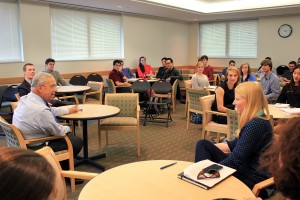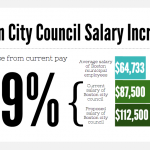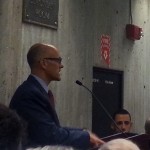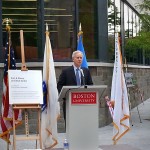
Former Boston Mayor Thomas Menino spoke to more than 30 Boston University students Wednesday about issues the city of Boston is facing and the importance of student involvement in local politics.
Menino, now a College of Arts and Sciences political science professor of the practice, fielded questions from students in the first monthly “Pizza and Politics” session, sponsored by the political science department.
CAS Associate Professor of Political Science Douglas Kriner, who organized the session, said having Menino on BU’s faculty is a great opportunity for him to engage with students and educate them about local politics.
“Local government — let’s face it — it directly touches our lives much more than state or national government,” Kriner said, listing issues, such as affordable housing, the public school system and the City’s budget that affect students. “These are the types of things that students should be engaging in now, and then they’ll have the opportunity if they stick around in Boston to really be leaders in a lot of these issues.”
Menino said voter apathy among the college-aged demographic reflects general attitudes toward public officials. However, he encouraged students to register to vote in Massachusetts and become more involved in politics in and around Boston.
Through voting, students have the opportunity to educate themselves about candidates for local office and ballot measures, but they often choose not to, he said.
“They don’t think government is an important factor in their lives,” Menino said. “People don’t trust their government today. There has to be a change in people’s ideas about their elected officials.”
Menino said to address disenchantment with the political system, public officials must establish a good relationship with their constituents.
“An elected official has to be trusted,” he said. “If they trust you as an elected official and trust you in the business world, you can do almost anything…You have to always tell the truth, sometimes even if it hurts, because people want you to be a leader and not a follower.”
When asked what he considers the most important issues facing Boston, Menino said inequality is the issue of the 21st century.
“The rich get richer, the working class gets poorer and the poor get real poor,” he said. “For a family with two kids or three kids, it’s very difficult to survive in this world today. You’ll always get there, but it’s hard work.”
Menino talked about the ways he addressed economic inequality during his 20 years as mayor, including subsidizing housing in the city and establishing the Office of New Bostonians to provide job training and legal services for foreign residents who might otherwise be hindered by a language barrier.
When asked if he would return for another talk, Menino said he would consider it if the next event featured better pizza.
Katie Reilly, a CAS sophomore, said it is of great benefit to the city and BU that Menino remains an active member of the community after leaving the mayoral office.
“You don’t really get to talk directly to political officials very often, and he’s definitely very active still in the community, even though he isn’t mayor anymore,” she said. “It really helps us when a city government is more involved with us and we get to talk the people representing us.”
Reilly said she appreciated Menino’s response to her question regarding issues facing Boston.
“I definitely agree with him on the inequality in incomes,” she said. “It’s something that’s visible in the community and something that’s really hard to improve, but I think that they definitely need to start working on improving it.”
Matthew Craig, a senior in the School of Education, said more young people would be involved in local politics if elected officials connected with the community as well as Menino has.
“It’s very cool to see somebody that was such a major player in Boston and in the state of Massachusetts,” he said. “Accessibility is a huge part of the reason why we’re so disillusioned, because we see these figures as not being human necessarily. When they’re so grounded and connected to the actual people, to their own communities, it’s worthwhile.”
Kathryn Devaney, a fourth-year student in the Graduate School of Arts and Sciences, said she appreciates the changes Menino made to Boston during the 10 years she has lived in the city. She said his connection to residents, especially after the Boston Marathon bombings, changed her perception of politicians.
“He would come by really frequently and talk to people, and had his finger on the pulse of what the people of the city were thinking,” she said. “When I was younger especially, I never really thought of politicians that way. Mayor Menino was the first politician I came in contact with who was very connected with his constituents.”





Please note: this event was organized by StuVi Faculty in Residence, Prof Doug Kriner (political science) and Prof Jillian Goldfarb (mechanical engineering) as part of Residence Life programming. The event was sponsored by the Departments of Political Science and Mechanical Engineering. Information about future events, such as the Congress to Campus visit on October 6, can be found on the BU calendar.